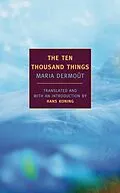Autorentext
Maria Dermoût (1888-1962) was born on a sugar plantation in the Dutch East Indies and educated in Holland. She then returned to the Indies with her husband, a jurist, and spent thirty years living in, she later wrote, "every town and wilderness of the islands of Java, Celebes, and the Moluccas." In 1951, at the age of sixty-three, Dermoût published her first book, a memoir called Yesterday. Her celebrated novel The Ten Thousand Things was published in 1955. Hans Koning, born Hans Koningsberger in Amsterdam, came to this country in 1951 and established himself as an American writer in 1958 with his first novel, The Affair. Among his other novels are A Walk with Love and Death, The Petersburg Cannes Express, The Kleber Flight, and, most recently, Zeeland, or Elective Concurrences.
Klappentext
The Ten Thousand Things is a novel of shimmering strangeness-the story of Felicia, who returns with her baby son from Holland to the Spice Islands of Indonesia, to the house and garden that were her birthplace, over which her powerful grandmother still presides. There Felicia finds herself wedded to an uncanny and dangerous world, full of mystery and violence, where objects tell tales, the dead come and go, and the past is as potent as the present. First published in Holland in 1955, Maria Dermoût's novel was immediately recognized as a magical work, like nothing else Dutch-or European-literature had seen before. The Ten Thousand Things is an entranced vision of a far-off place that is as convincingly real and intimate as it is exotic, a book that is at once a lament and an ecstatic ode to nature and life.
